For its 65th anniversary, CDEC (Centre for Jewish Contemporary Documentation) organized a very rich edition of New Israeli Cinema, with lots of screenings and meetings.
Five days of intense activity which brings to the milanese public a selection of the movies screened during the Pitigliani Kolno’a Festival held last november in Rome.
Dan Muggia and Ariela Piattelli, curators of the film reviews, chose some of the most meaningful Israeli productions of the last years, next to which some Italian movies about hebraism are shown.
The thread of this eight edition of the film review is clearly the family: all the movies are about this theme and they present different ways not only to treat the argument but also to mean it: what is really a “family”? How do you define it? How do you build it? These are just a few questions that the movies address to the audience: it is the personal meditation of the single person that can give voice to the subtext present in the works of art.
The opening movie is a homage to a great Israeli cinema and TV personality who died last year. Life as a Rumor (directed by Adi Arbel and Moish Goldberg, 2013) is a very interesting documentary about actor and director Assi (Asaf) Dayan, famous son of the fourth Israeli Chief of Staff, Moshe Dayan. The story is told by Assi himself while he is on the set of what will probably be his last movie and tells us the story of his life divided into chapters, building a narrative on the edge between biography and auto-biography, based on archive footage with his voice-over commenting on it. There are no interviews to other people: the whole story has a single point of view, which is nevertheless incredibly judgmental. Passing through the changes in the Israeli society and in the cinematographical audience, Assi Dayan takes stock and it seems he’s a failure: divorces, children desertion, suicide attempts, drugs abuse…
|
|
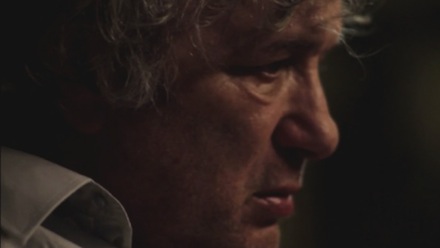
"Life as a Rumor", Adi Arbel e Moish Goldberg
|
Yet, looking from closer, we can always feel the urge of the creative search, of the artistic expression of something higher and honest which moved all his decisions and professional choices. Clearly, the call of the success has sometimes corrupted Dayan’s artistic journey, but the lucidity he uses to analize his own story leads us to admire the honesty and the depht of a man we could really define “cursed artist”.
Another homage to Assi Dayan was the screening of two episodes of BeTipul (Hagai Levi, 2005), focused on the meetings of a psycologist (played by Dayan) with his patients. The Italian audience finds here some known narrative patterns since the format was adapted in Italy, where the title was taked from the USA version (In treatment) and Dayan’s character is played by Sergio Castellitto.
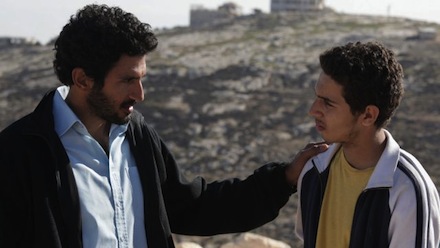
"Betlehem", Yuval Adler |
|
In Bethlehem, winner of the Venice Days section at the Venice Cinema Festival in 2013, Yuval Adler tells the story of Sarfur, a palestinian boy who works with the Israeli secret services. The themes of the moral dilemma, of the impossibility of denying our own roots and of the two worlds which militarly and ideologically oppose one another, are treated by the director with great depht and some pessimism. The audience is really involved by the two main characters (Sarfur and Razi, the Israeli agent who engaged him), even if the movie is a harsh and merciless - though very realistic - portrait of a situation doomed (according to the director’s view) not to change.
|
Big Bad Wolves (directed by Aharon Keshales and Navot Papushado, 2013) could be defined as a thriller, even if it does not respect all the rules of this genre: it’s a smart mix of detective-story and drama, with a spoon of humour (sometimes black). For the first Israeli movie about a serial killer, the directors rely upon very good actors (Lior Ashkenazi above all) and high-tension situations. The first sequence, in ralenti to create suspense, reminds us of Antichrist (Lars Von Trier; 2009) and creates in the audience a sense of uneasiness which will be kept high during the movie by the continue opposition between the dramas of the characters and the tarantinian pulp of the full-blooded sequences. Maybe there are too many irons in the fire (justice, trust, morality, pedophilia, paternal love) but in the end everything seems to be in the right place: even the bitter end serves to balance in the narrative the splatter of the tortures and the humour of the dialogues, while on the ethical pattern it is needed to remind us that reality is far more cruel than we can imagine or paint.
|
|
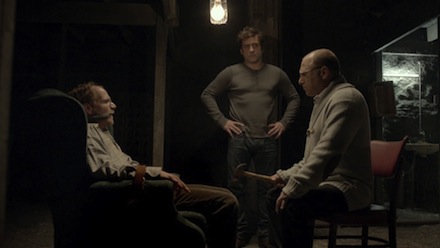
"Big Bad Wolves", Aharon Keshales e Navot Papushado
|
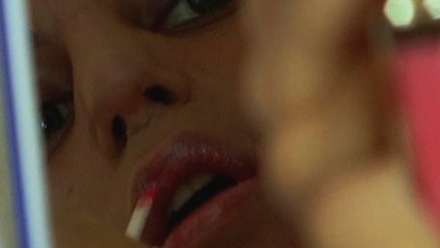
"The Good Son", Shirley Berkovitz |
|
TheGood Son by Shirly Berkovitz (2013) deals with the theme of sexual identity in a documentaristic way, telling the story of Or, a 22-year-old Israeli boy who decides to have his sex changed in Thailand to become a woman and to come back to his family to show them her true identity. The movie, marked by an extreme sensitivity, gives the highest importance to family bonds and to the need to be yourself, with the aim to state that we have the duty towards ourelves to be who we really are. The story develops like a video-diary, told in first person and in the present: scenes where Or hides the camera to record his conversations with the family members alternate with others where Berkovitz follows Or in Thailand to record his operation and his rehab, moments where he could not be both director and main character. Or often addresses the camera expressing his doubts, involving the audience on the narrative and emotional levels.
|
Magic Men (Guy Nattiv and Erez Tadmor, 2013) is really a magic tale because the story of Avraham, who searches the man who saved his life during the II World War, is involving, poetic, funny and deep. The script is faultless (only the end could raise some perplexities, not because of the narrative development – which is logic and correct – but for its not-necessity); the direction is impeccable (very ironic in the funny scenes and very careful to the introspection of the characters in the painful and thoughtful moments); the actors are perfect. This is a movie which blends the story of a search of the “other” with the interior finding of an important family bond, a tale which makes you laugh with tears in your eyes and moves you with the poeticity of its extraordinary-but-so-natural-story. A real jewel.
|
|
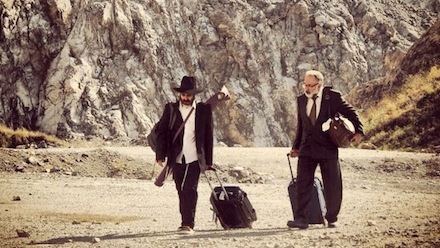
"Magic Men", Guy Nattiv e Erez Tadmor |
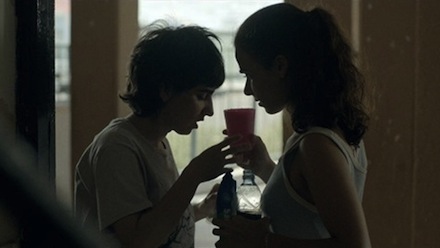
"Next to her", Asaf Korman |
|
Next to her by Asaf Korman (2014) paints the dynamics of two sisters living a peculiar situation: Heli decided to take care of disabled Gabi and is thus split between her job and the responsibility of the sister. When she has to put Gabi in a diurnal medical centre, the precarious balance of their lives breaks down, showing how Heli’s affection to her sister is dangerously close to a morbid bond which prevents her from having social and personal relations: the deep change brings also to the breaking off of the love-bond Heli is starting with a co-worker.
|
During the festival we had again the chance to see Matzor, beautiful movie directed by Gilberto Tofano in 1969, which narrates the siege (this is the meaning of the title) of Israeli society, expecially the psychological one in which the women live because of the behaviour of the men. The masterly performance of Gila Almagor (whom we appreciated in the role of Assi Dayan’s psychologist in one of the episodes of Betipul screened) presents a very modern portrait of the “war widow”, with a strong personality and a new attention to the psychology. Tofano, Italian by birth, proves to be a true connoisseur of the European artistic researches (expecially the French Nouvelle Vague) and he turns out to be Israeli in spirit for the deep knowledge of the mechanisms which rule the public relations and the social situations of a country which is always on the edge of a conflict.
|
|
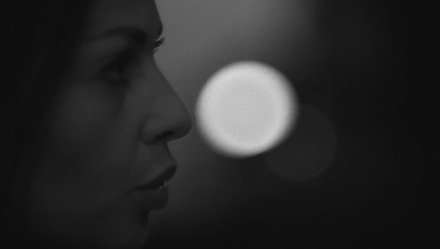
"Matzor", Gilberto Tofano
|
The last three movies screened have a strong bond with Italy. The nine minutes of La memoria che ritorna (Salvatore Di Segni) form a very important historical and cinematographic document because they are the only survived amatorial movie about the life of an Italian Jewish family before the Shoah. it’s set in 1923 and the camera of the Di Segni family shows us a wedding, some games in the park and a walk on the snow. Vera (directed by Francesca Melandri in 2010) is the true story of the extraordinary life of Vera Martin, a Croatian Jew born in 1924 and come to italy because she was saved by an Italian carabiniere. Vera raises horses now and the movie is built upon the alternance between her memories and a delicate situation she has to face when one of her mares has to give birth.
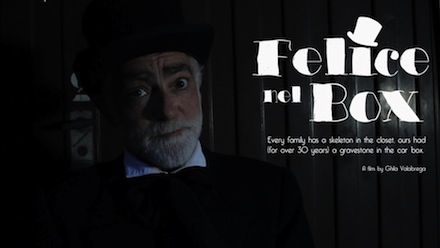
"Felice nel Box", Ghila Valabrega |
|
Felice nel box (directed by Ghila Valabrega, 2015) is the funny true story of the finding of a gravestone in the garage of the director’s family.
As a completion of the festival some presentations of books were held: La dieta Kasher by Rossella Tercatin and Svita by Luciano Bassani, Ladri nella notte by Arthur Koestler and Life on Mars by Fiammetta Martegani, these last two published by the new digital publishing house Tiqqun, exclusively committed to the Isaeli and Jewish literature.
This year, too, the Nuovo Cinema Israeliano Festival moved us and made us laugh, cry and think. See you next year, with the nineth edition 
|
|